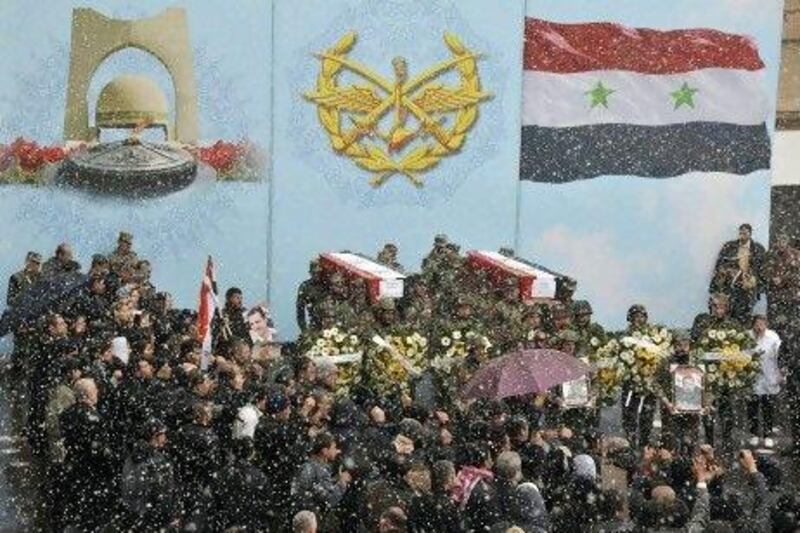Damascus // Security forces killed at least two people walking in a funeral procession in an upmarket neighbourhood of Damascus yesterday, a sign, some activists say, of the uprising edging ever closer to those in power.
On the diplomatic front, a Chinese envoy met president Bashar Al Assad yesterday in the Syrian capital and called for a halt to violence but also underlined Beijing would not support forced regime change in Damascus.
The shootings happened about a kilometre away from the presidential palace where Mr Al Assad typically receives foreign dignitaries, and is a similar distance from Omayyad Square, where the ministry of defence and the heavily fortified state-run television building are headquartered.
Activists said thousands of residents turned out for the funerals yesterday of four demonstrators killed on Friday, also in the upscale Mezzeh area, close to the neighbourhoods in which foreign diplomatic missions are located and many wealthy and upper-middle class families live.
"This is the biggest protest to be held in the heart of Damascus since the start of the uprising 11 months ago," said a Syrian political analyst, on condition of anonymity. "If there was any doubt the uprising had reached the capital city, this makes it very clear it has now arrived. It is an important moment."
As the revolt has spread across Syria, many in Damascus, especially regime supporters and those in the monied classes, have portrayed it as something small in scale and happening far away in inconsequential villages and towns, a narrative very much pushed by state media.
Protests have been regular in the capital for many months, but while Syria's elite might never have set foot in working-class neighbourhoods where demonstrations are typically held, Mezzeh is very much their backyard.
State-run media had made no mention of the protests or funerals there by yesterday afternoon.
In recent days, Damascus residents have spoken of intensifying security operations in the city by bolstered checkpoints separating it from outlying rural areas, and sweeping arrests in protest neighbourhoods.
Dozens of people were detained in Mezzeh yesterday, human-rights groups said, while the Local Coordination Committees activists network reported at least 12 people killed nationwide.
A number of leading regime critics, including Mazen Darwish, Razan Ghazzawi, and Yara Badr were also recently arrested in a raid on an office in the very heart of Damascus.
Mr Darwish and Ms Badr are both advocates of a peaceful uprising and Alawites, the sect Mr Al Assad and his inner circle belong to. The two activists have been prominent in efforts to prove the uprising has broad support among all Syrians, not just the Sunni majority.
Regime officials insist they are fighting a militant Islamic uprising, backed by foreign powers, and Mr Al Assad repeated that message during talks with Chinese vice foreign minister Zhai Jun yesterday.
"What Syria is facing is fundamentally an effort to divide it and affect its geopolitical place and historic role in the region," Mr Al Assad was quoted as saying by state media.
Mr Zhai said China called on "the government, the opposition and the rebels to halt acts of violence immediately" and went on to endorse a reform programme announced by the Syrian president, including a referendum on a new constitution scheduled for February 26.
"China supports the reforms under way in Syria and the significant measures taken by the country in this field," he said.
Opposition groups say Mr Al Assad's reforms are empty and continue to demand an immediate halt to security operations against protesters, for political prisoners to be freed and for the president to stand down.
A similar plan, drawn up by the Arab League, was overwhelmingly endorsed by the United Nations General Assembly last week but was earlier vetoed at the more powerful Security Council by Russia and China. Both of those countries have stood firmly by Mr Al Assad.
More than 7,000 people have been killed by regime security units since the uprising began in March, according to human rights groups, with the UN reporting systematic torture and use of lethal force against unarmed protesters. The Syrian government denies those charges and says more than 2,000 security personnel have been killed by armed insurgents.
Anti-regime groups have increasingly taken up weapons to fight Mr Al Assad's regime, fuelling fears Syria may already have slipped into civil war that could spread across the region.
US television network NBC News reported Friday that Washington had deployed unmanned intelligence drones over Syria to monitor attacks by regime forces against the opposition. It cited official sources, who said the operation was not part of a plan for greater military involvement.
Opposition activists say Syria has been using its own Russian-supplied drones to help artillery units hit rebel fighters.
Also Friday, Swiss media reported customs officials had seized mobile phone surveillance equipment en route to Syria and Iran without the proper export licences.
psands@thenational.ae
Violent protest in Syria moves closer to those in power
The killings in Damascus on Saturday happened about a kilometre away from the presidential palace where president Bashar Al Assad receives foreign dignitaries.

More from the national




